Works

A Voice from the Attic
Robertson Davies
The Diary of Samuel Marchbanks
Robertson Davies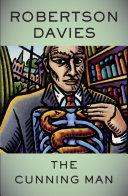
The Cunning Man
Robertson Davies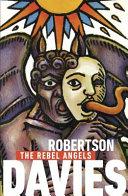
The Rebel Angels
Robertson Davies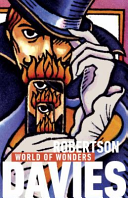
World of Wonders
Robertson Davies
Fifth Business
Robertson Davies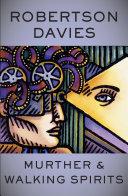
Murther and Walking Spirits
Robertson Davies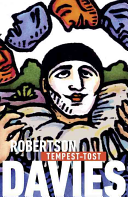
Tempest-Tost
Robertson DaviesFamous Robertson Davies Quotes
"College Master Looks at His World: Author Davies Finds Youth Little Changed".
Conversations with Robertson Davies (1989)
“Once or twice I have tried to talk to film people about my ugly heroine.”
Writing (1990).
Context: Once or twice I have tried to talk to film people about my ugly heroine. I explain to them the extraordinary psychological fascination of the medieval legend of the Loathly Damsel, whose splendour of spirit is confined within a hideous body, and she becomes beautiful only when she is understood and loved. I advise you not to talk to resolutely Hollywood minds about the Loathly Damsel. Their eyes glaze, and their cigars go out, and behind the lenses of their horn-rimmed spectacles I see the dominating symbol of their inner life: it is a dollar sign.
On Seeing Plays (1990).
Context: It is mankind's discovery of language which more than any other single thing has separated him from the animal creation. Without language, what concept have we of past or future as separated from the immediate present? Without language, how can we tell anyone what we feel, or what we think? It might be said that until he developed language, man had no soul, for without language how could he reach deep inside himself and discover the truths that are hidden there, or find out what emotions he shared, or did not share, with his fellow men and women. But because this greatest gift of all gifts is in daily use, and is smeared, and battered and trivialized by commonplace associations, we too often forget the splendour of which it is capable, and the pleasures that it can give, from the pen of a master.
Robertson Davies Quotes about people
"Gzowski on FM".
Conversations with Robertson Davies (1989)
"Prof. Robertson Davies: Courteous Conservative".
Conversations with Robertson Davies (1989)
"World of Wonders".
Conversations with Robertson Davies (1989)
The Three Warning Circles (1972).
“I wish people weren't so set on being themselves, when that means being a bastard.”
Source: The Rebel Angels
Robertson Davies Quotes about life
Part 4, section 28. The last lines of the novel.
The Cunning Man (1994)
Context: "Can you tell me the time of the last complete show?"
"You have the wrong number."
"Eh? Isn't this the Odeon?"
I decide to give a Burtonian answer.
"No, this is the Great Theatre of Life. Admission is free but the taxation is mortal. You come when you can, and leave when you must. The show is continuous. Good-night."
Source: The Deptford Trilogy: Fifth Business/The Manticore/World of Wonders
“Any enjoyment or profit we get from life, we get Now; to kill Now is to abridge our own lives.”
A Voice from the Attic (1960)
Edward Johnston (1960).
The Golden Ass (1999)
Robertson Davies: Trending quotes
Three Worlds, Three Summers — But Not the Summer Just Past (1949).
Context: One might think, to hear some people talk, that this had been a particularly fine summer. From their point of view, I suppose, it has. They have rushed about the lakes in noisy little boats; they have permitted themselves to be dragged behind other little boats, standing more or less upright on ironing boards; they have immersed themselves in lakes into which countless summer cottage privies drain; they have laboriously pursued summer flirtations, and some of them have achieved gritty conquests on the sands; they have sat in hot little boats waiting to catch fish which they have then had to eat; they have passed many hours changing their skins from pinkish-drab to brown, erroneously believing that they are "storing up sunshine" against the winter months; they have motored penitential distances; they have taken thousands of feet of film of people whose names they will not be able to remember in November. They have amused themselves after their fashion, and I have no quarrel with them.
Review of Nabokov's Lolita (1958).
Context: Many authors write like amateur blacksmiths making their first horseshoe; the clank of the anvil, the stench of the scorched leather apron, the sparks and the cursing are palpable, and this appeals to those who rank "sincerity" very high. Nabokov is more like a master swordsmith making a fine blade; nothing is amiss, nothing is too much, there is no fuss, and the finished product must be handled with great care, or it will cut you badly.
Robertson Davies Quotes
Part 2, section 6.
The Cunning Man (1994)
Context: The ironist is not bitter, he does not seek to undercut everything that seems worthy or serious, he scorns the cheap scoring-off of the wisecracker. He stands, so to speak, somewhat at one side, observes and speaks with a moderation which is occasionally embellished with a flash of controlled exaggeration. He speaks from a certain depth, and thus he is not of the same nature as the wit, who so often speaks from the tongue and no deeper. The wit's desire is to be funny; the ironist is only funny as a secondary achievement.
Introduction.
The Papers of Samuel Marchbanks (1985)
Context: Have you never read the manifesto of the Marchbanks Humanist Party? How does it begin?
The more taboos and prohibitions there are in the world
The poorer the people will be.
The more sharp weapons the people have
The more troubled the state will be.
The more cunning and skill man possesses
The more vicious things will appear.
The more laws and orders are made prominent
The more thieves and robbers there will be.
And who wrote that, do you suppose?" "You, I imagine." "No, you don't imagine. That's what's wrong with you, and your kind; you don't, and can't imagine. Those words were written by the Chinese sage Lao Tzu in the sixth century BC.
A Voice from the Attic (1960)
Context: An old friend of mine who died recently at a great age was, in infancy, held on the knee of an elderly godmother who had been, in her infancy, held on the knee of yet another godmother who had been held on the knee of Queen Anne, who died in 1714. Viewed unsympathetically, this is nothing, a chance association-by-knees; yet if we cherish life, and are not mere creatures of death and sepulcher, deluded by the notion that only our own experience is real and our demise the end of the world, we see in it a reminder that we are all beads on a string — separate yet part of a unity.
The Table Talk of Samuel Marchbanks (1949)
Context: If you attack stupidity, you attack an entrenched interest with friends in government and every walk of public life, and you will make small progress against it.
“He sets a thief to guard his purse
Who trusts a dial with his hours”
The Golden Ass (1999)
Context: He sets a thief to guard his purse
Who trusts a dial with his hours
Or bids a sand-glass bleed away his nights,
His days, his loves, his pleasures and his powers.
The burthen of his years
Is Time's soft footfall, Time's soft
Falling
Through his joys and tears.
Alchemy in the Theatre (1994).
Context: Great drama, drama that may reach the alchemical level, must have dimension and its relevance will take care of itself. Writing about AIDS rather than the cocktail set, or possibly the fairy kingdom, will not guarantee importance.... The old comment that all periods of time are at an equal distance from eternity says much, and pondering on it will lead to alchemical theatre while relevance becomes old hat.
Samuel Marchbanks' Almanack (1967)
Context: Was driving through the countryside today with some people who insisted upon frequent recourse to a roadmap in order to discover, as they put it, "Just where they were." Reflected that for my part I generally have a pretty shrewd idea of just where I am; I am enclosed in the somewhat vulnerable fortress which is my body, and from that uneasy stronghold I make such sorties as I deem advisable into the realm about me. These people seemed to think that whizzing through space in a car really altered the universe for them, but they were wrong; each one remained right in the centre of his private universe, which is the only field of knowledge of which he has any direct experience.
“Modern man is a debtor, or he is nothing, and money becomes more and more illusory.”
The Table Talk of Samuel Marchbanks (1949)
Context: Readers will immediately divine that this was written before the advent of the credit card. After this invention grasped commerce in its clutch, Marchbanks found that unless he had one he was without Fiscal Credibility; if he had no debts he did not exist. Modern man is a debtor, or he is nothing, and money becomes more and more illusory.
"Robertson Davies: Beyond the Visible World".
Conversations with Robertson Davies (1989)
Context: The word "religion" just means "law," the consideration of law and consequence. That's what interests me: what happens as a result of what people do. Also the reluctance people have to learn that certain actions will bring certain consequences … people don't learn. Over and over again they do the same stupid things without having learned what happens. … We are not wise because we are always looking for causes for things which are outside ourselves.
Judith Grant interview (1999)
Context: I literally never meet anybody who ever talks about God as something other than a kind of big man. I think God is a wondrous spirit, infinite, eternal, and unchangeable, but only interested in men as part of a giant creation which is pulsing with life.
People say, when a relative dies: "Oh, how could God have taken her away so young and with so much before her?" God doesn't give a bugger about how young she is. He probably isn't noticing particularly. That's just the way a lot of things happen. A lot gets spilled, you know, in nature. When you look at what's going on out there now, those trees are dropping seeds by literally the hundreds of thousands and millions, and one or two of them may take on. I think that that is the way that God functions. He doesn't care nearly as much about individuals and individual fates as we would like to suppose. But by trying to ally ourselves with the totality of things, we may get into Tao as they say in the East and be part of it, really take part in it, and not just regard ourselves as a kind of miraculous creation and the rest just sort of stage scenery against which we perform.
"World of Wonders".
Conversations with Robertson Davies (1989)
Context: A sense of wonder is in itself a religious feeling. But in so many people the sense of wonder gets lost. It gets scarred over. It's as though a tortoise shell has grown over it. People reach a stage where they're never surprised, never delighted. They're never suddenly aware of glorious freedom or splendour in their lives. This is very unhappy, very unfortunate. The attitude is often self-induced. It is fear. People are afraid to be happy.
The Table Talk of Samuel Marchbanks (1949)
Context: God knows I have little interest in animals, but I do not like to see them insulted. I used to feel the same thing in the days when I was a frequent visitor at the London Zoo; in the lion house there were always ninnies who mocked the captive lions. I often wished that the bars would turn to butter, and that the great, noble beasts would practise their particular form of wit upon the little, ignoble men.
Shakespeare over the Port (1960)
Introduction to Fortune, My Foe and Eros at Breakfast (c. 1993).
Context: The truth is that art does not teach; it makes you feel, and any teaching that may arise from the feeling is an extra, and must not be stressed too much. In the modern world, and in Canada as much as anywhere, we are obsessed with the notion that to think is the highest achievement of mankind, but we neglect the fact that thought untouched by feeling is thin, delusive, treacherous stuff.
On Seeing Plays (1990).
Context: It is mankind's discovery of language which more than any other single thing has separated him from the animal creation. Without language, what concept have we of past or future as separated from the immediate present? Without language, how can we tell anyone what we feel, or what we think? It might be said that until he developed language, man had no soul, for without language how could he reach deep inside himself and discover the truths that are hidden there, or find out what emotions he shared, or did not share, with his fellow men and women. But because this greatest gift of all gifts is in daily use, and is smeared, and battered and trivialized by commonplace associations, we too often forget the splendour of which it is capable, and the pleasures that it can give, from the pen of a master.
“They have amused themselves after their fashion, and I have no quarrel with them.”
Three Worlds, Three Summers — But Not the Summer Just Past (1949).
Context: One might think, to hear some people talk, that this had been a particularly fine summer. From their point of view, I suppose, it has. They have rushed about the lakes in noisy little boats; they have permitted themselves to be dragged behind other little boats, standing more or less upright on ironing boards; they have immersed themselves in lakes into which countless summer cottage privies drain; they have laboriously pursued summer flirtations, and some of them have achieved gritty conquests on the sands; they have sat in hot little boats waiting to catch fish which they have then had to eat; they have passed many hours changing their skins from pinkish-drab to brown, erroneously believing that they are "storing up sunshine" against the winter months; they have motored penitential distances; they have taken thousands of feet of film of people whose names they will not be able to remember in November. They have amused themselves after their fashion, and I have no quarrel with them.
A Voice from the Attic (1960)
Context: There is no reason to suppose that people today feel less than their grandfathers, but there is good reason to think that they are less able to read in a way which makes them feel. It is natural for them to blame books rather than themselves, and to demand fiction which is highly peppered, like a glutton whose palate is defective.
Samuel Marchbanks' Almanack (1967)
Context: I like long and unusual words, and anybody who does not share my tastes is not compelled to read me. Policemen and politicians are under some obligation to make themselves comprehensible to the intellectually stunted, but not I. Let my prose be tenebrous and rebarbative; let my pennyworth of thought be muffled in gorgeous habilements; lovers of Basic English will look to me in vain.
"Haunted by Halloween", in the New York Times (31 October 1990).
Context: Our forebears are deserving of tribute for one indisputable reason, if for no other: without them we should not be here. Let us recognize that we are not the ultimate triumph but rather we are beads on a string. Let us behave with decency to the beads that were strung before us and hope modestly that the beads that come after us will not hold us of no account simply because we are dead.
The Diary of Samuel Marchbanks (1947)
Context: But I wonder if people do not attach too much importance to the first-name habit? Every man and woman is a mystery, built like those Chinese puzzles which consist of one box inside another, so that ten or twelve boxes have to be opened before the final solution is found. Not more than two or three people have ever penetrated beyond my outside box, and there are not many people whom I have explored further; if anyone imagines that being on first-name terms with somebody magically strips away all the boxes and reveals the inner treasure he still has a great deal to learn about human nature. There are people, of course, who consist only of one box, and that a cardboard carton, containing nothing at all.
Writing (1990).
Context: Once or twice I have tried to talk to film people about my ugly heroine. I explain to them the extraordinary psychological fascination of the medieval legend of the Loathly Damsel, whose splendour of spirit is confined within a hideous body, and she becomes beautiful only when she is understood and loved. I advise you not to talk to resolutely Hollywood minds about the Loathly Damsel. Their eyes glaze, and their cigars go out, and behind the lenses of their horn-rimmed spectacles I see the dominating symbol of their inner life: it is a dollar sign.
Samuel Marchbanks' Almanack (1967)
Context: Was driving through the countryside today with some people who insisted upon frequent recourse to a roadmap in order to discover, as they put it, "Just where they were." Reflected that for my part I generally have a pretty shrewd idea of just where I am; I am enclosed in the somewhat vulnerable fortress which is my body, and from that uneasy stronghold I make such sorties as I deem advisable into the realm about me. These people seemed to think that whizzing through space in a car really altered the universe for them, but they were wrong; each one remained right in the centre of his private universe, which is the only field of knowledge of which he has any direct experience.
Judith Grant interview (1999)
Context: I literally never meet anybody who ever talks about God as something other than a kind of big man. I think God is a wondrous spirit, infinite, eternal, and unchangeable, but only interested in men as part of a giant creation which is pulsing with life.
People say, when a relative dies: "Oh, how could God have taken her away so young and with so much before her?" God doesn't give a bugger about how young she is. He probably isn't noticing particularly. That's just the way a lot of things happen. A lot gets spilled, you know, in nature. When you look at what's going on out there now, those trees are dropping seeds by literally the hundreds of thousands and millions, and one or two of them may take on. I think that that is the way that God functions. He doesn't care nearly as much about individuals and individual fates as we would like to suppose. But by trying to ally ourselves with the totality of things, we may get into Tao as they say in the East and be part of it, really take part in it, and not just regard ourselves as a kind of miraculous creation and the rest just sort of stage scenery against which we perform.
“The wit's desire is to be funny; the ironist is only funny as a secondary achievement.”
Part 2, section 6.
The Cunning Man (1994)
Context: The ironist is not bitter, he does not seek to undercut everything that seems worthy or serious, he scorns the cheap scoring-off of the wisecracker. He stands, so to speak, somewhat at one side, observes and speaks with a moderation which is occasionally embellished with a flash of controlled exaggeration. He speaks from a certain depth, and thus he is not of the same nature as the wit, who so often speaks from the tongue and no deeper. The wit's desire is to be funny; the ironist is only funny as a secondary achievement.
From a letter published in The Merry Heart : Reflections on Reading Writing, and the World of Books (1996).
Context: To ask an author who hopes to be a serious writer if his work is autobiographical is like asking a spider where he buys his thread. The spider gets his thread right out of his own guts, and that is where the author gets his writing.
Jung and the Writer (1989).
Context: The most dismaying call of this kind came one night at nine o'clock from a youth of sixteen who said: "I've got to have this essay ready to hand in tomorrow morning, and I'm stuck. Can you give me some help with these-here Jungian archeotypes?" It was impossible to explain to him that no telephone conversation could help him; indeed, in his agony, I do not know what would have helped him except sudden and merciful death.
Dylan Thomas and Hector Berlioz (1956).
Context: Genius is unquestionably a great trial, when it takes the romantic form, and genius and romance are so associated in the public mind that many people recognize no other kind. There are other forms of genius, of course, and though they create their own problems, they are not "impossible" people. But O, how deeply we should thank God for these impossible people like Berlioz and Dylan Thomas! What a weary, grey, well-ordered, polite, unendurable hell this would be without them!
A Voice from the Attic (1960)
Context: The climate of his mind is so salubrious, so invigorating, that dull thoughts and heavy cares are dispelled by contact with it.
And is not this the true end of scholarship? It is to make us wise, of course, but what is the use of being wise if we are not sometimes merry? The merriment of wise men is not the uninformed, gross fun of ignorant men, but it has more kinship with that than the pinched, frightened fun of those who are neither learned nor ignorant, gentle nor simple, bound nor free. The idea that a wise man must be solemn is bred and preserved among people who have no idea what wisdom is, and can only respect whatever makes them feel inferior.
“Try as we will, we cannot be intimate with a shadow on a screen, nor a voice from a box.”
Lew Fields (1941).
Context: Only in the theatre was it possible to see the performers and to be warmed by their personal charm, to respond to their efforts and to feel their response to the applause and appreciative laughter of the audience. It had an intimate quality; audience and actors conspired to make a little oasis of happiness and mirth within the walls of the theatre. Try as we will, we cannot be intimate with a shadow on a screen, nor a voice from a box.
The Pleasures of Love (1961).
Context: The pleasures of love are for those who are hopelessly addicted to another living creature. The reasons for such addiction are so many that I suspect they are never the same in any two cases. It includes passion but does not survive by passion; it has its whiffs of the agreeable vertigo of young love, but it is stable more often than dizzy; it is a growing, changing thing, and it is tactful enough to give the addicted parties occasional rests from strong and exhausting feeling of any kind.
“I do not care about "weeks", and every week is a cat week with me.”
mehitabel (1959).
Context: The first week of this month was International Cat Week, and as the cat is, above all animals, the writer's pet, I suppose I should have written something about it. But I do not care about "weeks", and every week is a cat week with me.
I Remember Creatore (1948).
Context: My curiosity was in no way cruel. Deviations from the commonplace attracted me strongly, as they still do; and to me the hermaphrodite and the living skeleton were interesting for the same reason as was Creatore, or the resplendent Guardsmen of the bands — because such people did not often come my way, and I hoped that they might impart some great revelation to me, some insight which would help me to a clearer understanding of the world about me.
“It seems to me that most of us get all the adventure we are capable of digesting.”
The Diary of Samuel Marchbanks (1947)
Context: It seems to me that most of us get all the adventure we are capable of digesting. Personally, I have never had to fight a dozen pirates single-handed, and I have never jumped from a moving express-train onto the back of a horse, and I have never been discovered in the harem of the Grand Turk. I am glad of all these things. They are too rich for my digestion, and I do not long for them. I have all the close shaves and narrow squeaks in my life that my constitution will stand, and my daily struggles with bureaucrats, taxgatherers and uplifters are more exhausting than any encounters with mere buccaneers on the Spanish Main.
Opera and Humour (1991)
Context: The mind of man, though perhaps the most splendid achievement of evolution, is not, surely, that answer to every problem of the universe. Hamlet suffers, but the Gravediggers go right on with their silly quibbles.
“"There is no disputing about tastes," says the old saw. In my experience there is little else.”
Samuel Marchbanks' Almanack (1967)
Harper of the Stones (1986).
Context: Again he struck the harp and began the jig. But this time it was such music as never came from a harp. It was the wildest, strangest music you ever heard, full of the sound of birds and the cries of animals and the wind and the rain, and the thunder and the lightning, and the dashing of huge waves against the shores of a great cold ocean that was formed from ice that had made its way slowly down from Ultima Thule. It was the sound of a world before mankind. It was the sound of the great merriment God must have known during the long days of Creation.
"Robertson Davies" [by Paul Soles]
Conversations with Robertson Davies (1989)
Context: I expect that Hell is very heavily populated with just exactly that sort of person [who feels he's accomplished all his goals early in life] because, you know, somebody who fears that he has exhausted what there is for him to do and what he can do at thirty-five, is a fool. What he means is that he's become the sales manager of International Widgets or some wretched thing. That's not a life, that's not a thing that should occupy a man. People drive themselves terribly hard at these jobs, and they develop a sort of mystique about something which does not admit of a mystique. A thing to have a mystique must necessarily have many aspects, many corridors, many avenues, many things that open up. Well, this is not to be found in the business world, and I've known a lot of first-class businessmen and they all tell you this. People have told me that in their particular business there's nothing to be learned that an intelligent man can't learn in eighteen months. But if you've learned it in eighteen months and if you're exhausted by the time you're thirty-five, it's nobody's fault but your own if you haven't found something else to do.
"Conversations with Gordon Roper".
Conversations with Robertson Davies (1989)
Context: I think possibly the final sophistication is the recovery of innocence. Where you really get where you take things rather simply. You can't have the innocence of peasants; you are not a peasant; you can't be one of them. But you have to work awfully hard to recover that with a few additional hot licks, by getting smart, wise. I think the final gift of sophistication would be a kind of innocent, clean view of things — which doesn't mean a simple, dumb view.
"Acta Interviews Robertson Davies".
Conversations with Robertson Davies (1989)
Context: [People] think of saints as people who lived an awfully long time ago and whose validity has disappeared. I think of them as people who didn't live such a long time ago, only a few hundred years or so. There must have been something about them that impressed people who were very much like me. What was it? And they must have been much more like somebody living today than we commonly think. What was behind it? What made these people special and what made a lot of other people regard them as special, either hating them or loving them? This is fascinating. It enlarges the whole world, and because it does so, it gives you great hope and sympathy with the future. You find yourself not an isolated miserable little wretch who has got seventy or eighty years to struggle along and then perish like nothing. You are the continuer of a very great tradition which you are going to pass on to the next lot. And you're right in the middle of the great stream of life. You see? Wonderful thing.
“Much like ourselves, in fact, though rather dirtier.”
The Girl with the Swansdown Seat/Abode of Love/1848 (1956).
Context: The Victorians have been immoderately praised, and immoderately blamed, and surely it is time we formed some reasonable picture of them? There was their courageous, intellectually adventurous side, their greedy and inhuman side, their superbly poetic side, their morally pretentious side, their tea and buttered toast side, and their champagne and Skittles side. Much like ourselves, in fact, though rather dirtier.
A Voice from the Attic (1960)
Context: Complementary to his is Thurber's remark that "humour is a kind of emotional chaos, told about quietly and calmly in retrospect". Emotional chaos is not pleasant; distillation of that chaos afterward may perhaps be pleasant in some of its aspects, and undoubtedly gives pleasure to others.
The Pleasures of Love
Context: I am constantly astonished by the people, otherwise intelligent, who think that anything so complex and delicate as a marriage can be left to take care of itself. One sees them fussing about all sorts of lesser concerns, apparently unaware that side by side with them — often in the same bed — a human creature is perishing from lack of affection, of emotional malnutrition.
Ham and Tongue.
One-Half of Robertson Davies (1977)
Context: I have never consciously "used" humour in my life. Such humour as I may have is one of the elements in which I live. I cannot recall a time when I was not conscious of the deep, heaving, rolling ocean of hilarity that lies so very near the surface of life in most of its aspects. If I am a moralist — and I suppose I am — I am certainly not a gloomy moralist, and if humour finds its way into my work it is because I cannot help it.
The Golden Ass (1999)
Context: They live and laugh who know the better part —
Count length of pleasure not by dial or glass
But by the heart;
What are our fears
When Time's slow footfall, fall, fall
Falling
Turns lovers' hours to years?
Ham and Tongue.
One-Half of Robertson Davies (1977)
Context: I have never consciously "used" humour in my life. Such humour as I may have is one of the elements in which I live. I cannot recall a time when I was not conscious of the deep, heaving, rolling ocean of hilarity that lies so very near the surface of life in most of its aspects. If I am a moralist — and I suppose I am — I am certainly not a gloomy moralist, and if humour finds its way into my work it is because I cannot help it.
A Rake at Reading (1980).
Context: Sometimes there was a serious article on a hot topic, and I especially remember one by a bishop headed "Is Nudity Salacious?" The bishop thought it need not be, if encountered in the proper spirit, but he gave a lot of enlightening examples of conditions under which it might be, in his word, "inflammatory." There wasn't much nudity in our neck of the woods, and I enjoyed that article tremendously.
"Robertson Davies" [by Paul Soles]
Conversations with Robertson Davies (1989)
Context: Well, I haven't got wealth or fame, but I really think I might say, and I know how dangerous it is to say this — I think I have happiness. And happiness, you know, so many people when they talk about happiness, seem to think that it is a constant state of near lunacy, that you're always hopping about like a fairy in a cartoon strip, and being noisily and obstreperously happy. I don't think that is it at all. Happiness is a certain degree of calm, a certain degree of having your feet rooted firmly in the ground, of being aware that however miserable things are at the moment that they're probably not going to be so bad after awhile, or possibly they may be going very well now, but you must keep your head because they're not going to be so good later. Happiness is a very deep and dispersed state. It's not a kind of excitement.
A Voice from the Attic (1960)
Context: Prayer is petition, intercession, adoration, and contemplation; great saints and mystics have agreed on this definition. To stop short at petition is to pray only in a crippled fashion. Further, such prayer encourages one of the faults which is most reprehended by spiritual instructors — turning to God without turning from Self.
Scraps and Morsels (1960).
Context: Strange reading? It is meant to be. The world is full of romantic, macabre, improbable things which would never do in works of fiction. When those that come within one man's notice are gathered together in a scrapbook, they tell of a world which sobersided folk may not choose to recognize as their own. But it is their own; I have the evidence.